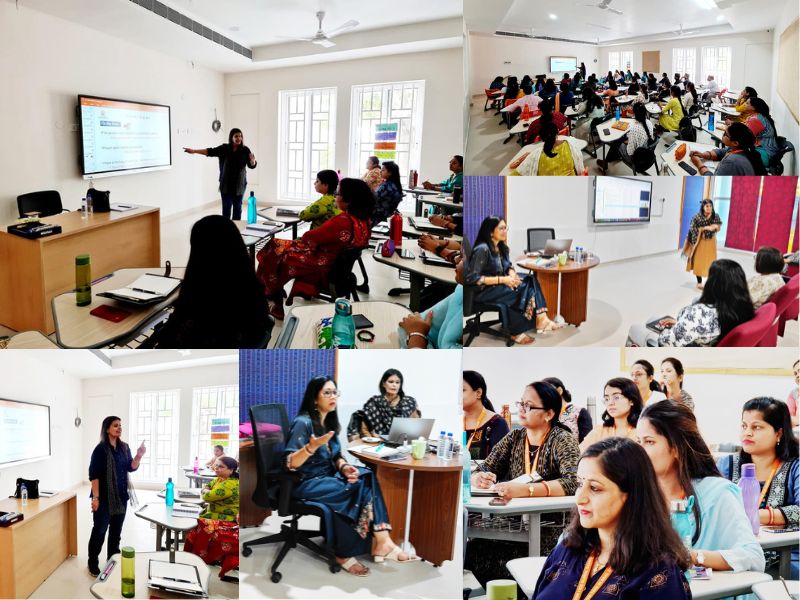DN Wisdom Tree Global School: Empowered teachers, informed & effective teaching
In today’s educational landscape, there are a multiplicity of schools, an inadequate number of trained teachers, and an emergent body of vocal working parents who look for increasing accountability from their children’s schools. A K12 school is thus faced with challenges on several dimensions. The school leadership is buffeted by demands on so many administrative fronts, that academics and human resource development often take second priority. It makes sense, therefore, that the institution is supported by able leaders to share responsibilities and add their contribution on areas of focus.

In a stand-alone educational entity such as The DN Wisdom Tree Global School, with the vision of transforming the K12 arena in the state, it is imperative to create a strong academic team – not only to navigate a diverse and challenging educational landscape but also to script principles, policies, and practices that ensure both longevity and scalability for expansion.
Training of teachers becomes a critical function occupying centre stage for the school to truly deliver what it intends to in educational excellence. Needless to say, some teachers who come with fresh degrees are not only inexperienced by definition, but also inadequately equipped in socio-cultural terms to deliver classes with accuracy and impact, and hold sway over students.
This provides The DN Wisdom Tree Global School with opportunities to make its mark early on, as a great training ground for teachers who want to build serious careers in education. By offering training and mentorship of an exceptional level, The DN Wisdom Tree Global School has built its reputation amongst the teaching fraternity as a workplace of choice.
By diffusion, the image of a good internal teacher training institution should soon morph to an image of a school that imparts sound and effective education for students, making it a desirable destination for parents who want quality education of global standards for their children.
Some pointers which help us to understand the kind of training required for teachers:
- Professional development can no longer just be about exposing teachers to a concept or providing basic knowledge about a teaching methodology. Instead, professional development in an era of accountability requires a change in the teachers’ practice that leads to increments in student learning.
- Simply put, traditional professional development operates under a faulty theory of teacher learning. The only challenge facing teachers is a lack of knowledge of effective teaching practices and when that knowledge gap is corrected, teachers will then be able to change. Research finds otherwise. It turns out that the teachers’ greatest challenge comes when they attempt to implement newly learned methods in the classroom. In all forms of learning a new skill, mere knowledge of it is never as difficult as its implementation.
We often ask questions about how students learn, but not often about how teachers learn.
Recent education reforms and standards urge teachers to incorporate students’ prior knowledge, make learning social through collaboration and discussion, and engage students in meaning-making. Paradoxically, most schools rarely apply these same learning theories to teachers’ own learning. If teachers cannot simply “pour” knowledge into students’ minds through lectures, what makes school leaders think that the same can be done with teachers?
Ultimately, research tells us that teachers learn much the same way that students do. When teachers are first introduced to a concept or teaching skill, their learning should be active, not passive. Further, when students write an essay, prove their mathematical thinking, or design an experiment, the application of the skill is far more challenging than simply recognizing the logic behind it. The same is true for teachers. Several researchers have called this the “implementation dip” of practice where the first integration of a new skill into existing practice is often awkward, requiring several more practices before the skill is mastered.
The Leading Role of Research and Development:
The DN Wisdom Tree Global School has embraced the vision of being a truly forward-thinking school. As part of addressing its mission of achieving excellence, the school has been spearheading its Staff Development Programme (SDP) through the R&D Centre. The Head of R& D has been hosting a series of talks, workshops, and exercises with internal and external resources, to focus on empowering teachers to aspire to innovate in pedagogical practice, life skills development, and the propagation of Indian values with global compatibility.
Our R&D team comprising of highly qualified coaches who have a combination of administrative and innovative practice experience, encourages teachers to design and craft their own professional development course. This goes towards building educator relationships across our system, balancing individual work with collaborative learning, and establishing a culture of growth. Teachers also receive regular and personalized training or mentoring to equip them with various teaching techniques based on student learning needs, interest, and literacy strategies.
The R&D Centre is designed to be an agile change engine that works by creating, facilitating, and guiding coalitions of interested, motivated people throughout the school to explore beyond curricular boundaries and build life-long learning and professional development.
At The DN Wisdom Tree Global School, we curate personalized improvement plans for our teachers:
Effective teachers are the most important factor contributing to student achievement. So, when teaching performance issues come up, school leaders need to address them head-on. Sometimes, establishing a stronger coaching connection is enough to help teachers improve their teaching practice. At other times we provide a more structured plan that addresses the areas where the teacher has been consistently evaluated as below effective. Our personalized coaching plan is not something that we do ‘to’ teachers, but something that is done ‘with’ teachers.
We provide specific and constructive feedback during the formative phase of evaluation to our teachers. This helps them to identify strengths and specific points upon which to improve. At The DN Wisdom Tree Global School, our post-observation conversations are always conducted with a growth mindset.
Asking teachers to change their instructional practices or interpersonal skills is asking a lot. Most human behaviors do not change overnight and certainly do not become routine with a few weeks of random practice. Although there are circumstances requiring immediate teacher reaction, most behaviors and situations require time and coaching to improve. The experience level of the teacher may be a factor to be considered, as well as the complexity of the desired action. At The DN Wisdom Tree Global School, the training programme is designed such that we set realistic goals.
Before implementing our training plan, we reflect on the persona of the teacher. We take into account how a particular teacher is going to react and decide if the training is worth it. We understand that all teachers will require some added positive attention from our coaches to preserve the rapport we need to establish.
Phases of Our Training Programme:
Phase 1: Training and Support: Teachers must acquire the knowledge that will allow them to identify and understand the actions we are asking of them. They need to be given resources, and time; they need to acquire the knowledge and to understand the nuances behind these changes. Sending a teacher straight in to implementation without proper understanding and foundation is a recipe for disaster. At The DN Wisdom Tree Global School, coaches lay the groundwork for effective change by allowing a teacher to gather knowledge through books, webinars, peer interaction, and observations.
Phase 2: Implementation: Once the teacher is on solid footing and understands what is being asked of them, coaches guide the teachers to implement the identified action. We make sure to break down the implementation phase into manageable steps. Progressing through a series of small actions that lead to the accomplishment of the goal is much more likely to result in success. We make sure that each activity and expectation designed in the implementation phase is directly aligned with the goal. This phase requires time to practice and teachers may experience failure and frustration. We understand that rushing this phase will only produce compliance and not true lasting change.
Phase 3: Monitoring the Plan: Coaches and trainers closely monitor the training schedules, but teachers are also responsible for gathering evidence and presenting it to their mentors and coaches in a timely fashion. While monitoring, our coaches try their best to help teachers succeed by giving them more or less time, revising or adding action steps, and simplifying or clarifying expectations – all according to the needs of the teacher. By doing this, it demonstrates to all involved that the intentions are earnest and we are guiding the process with integrity.
Built in Accountability:
At The DN Wisdom Tree Global School, we believe that a training programme without accountability is no more than a hope and a prayer. All the above three phases specify hard evidence to be collected that will allow the teacher to demonstrate they have completed each step of the action plan with fidelity and quality.
The DN Wisdom Tree Global School Teachers’ Training Programme falls into four general categories:
- To improve a teacher’s instructional skills and strategies – this addresses a wide scope of instructional concerns, including concerns about a specific teaching skill, pedagogical practices, subject knowledge, lesson planning and delivery, and the implementation of an instructional programme.
- To improve a teacher’s communication skills – these issues could include the inability to provide appropriate written and verbal communication, a general lack of communication, or issues with a teacher’s grading policy and instructional feedback with students, parents, and peers.
- To improve student management – this relates to those teachers struggling to manage students, and lack classroom management skills, and student behaviour strategies.
- To improve adherence to organizational expectations and school policies – these relate to concerns that must be addressed and corrected immediately and the coaches along with the leadership team are often more direct in style; such as teachers consistently arriving late to work, not meeting deadlines, attitude issues with seniors and administration staff, and lastly who demonstrates severe disregard of school policies.
At The DN Wisdom Tree Global School, we encourage teachers to self-reflect.
In Conclusion:
A ‘Professional Development’ plan for teachers is often thought of as a negative tool because of many reasons. But at The DN Wisdom Tree Global School, our ‘WizGurus’ do not have a negative experience. Our training programme is meant to give our teachers the support they need to improve and better their skills and accomplish their goals.
We empower and trust our teachers to take risks and try out new things. When this level of trust is missing, they may feel it is safer to continue to do the wrong thing than to take a chance on change. Although it can take time, building trust in the teacher evaluation plan and training programme is critical for sustained instructional improvement.
In the present, it is imperative to shift from traditional teaching that is largely based on theoretical educational processes to a research-theory-based teaching that informs and inspires teaching practices. At The DN Wisdom Tree Global School, we are committed to empowering teachers through continual training and professional development, a crucial ingredient to support innovative and beneficial teaching.
Also read: The DN Wisdom Tree Global School: Parents are Collaborative Partners

















Add comment